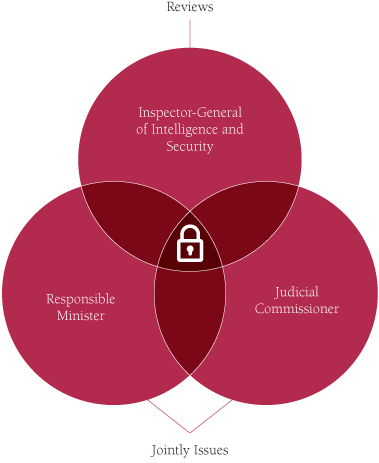A new authorisation regime for warrants
What the Act does
- Provides that both agencies must obtain a Type 1 intelligence warrant for activities targeting New Zealanders which would otherwise be unlawful.
- Creates a ‘triple lock’ system to protect New Zealanders.
- A Type 1 intelligence warrant:
- must be approved by the Minister responsible for the relevant intelligence and security agency
- must be approved by a Commissioner of Intelligence Warrants and
- is subject to review by the Inspector-General of Intelligence and Security.
- Ensures New Zealanders can only be targeted for the purpose of protecting national security or where they are an agent of a foreign power (meaning they are working for a foreign state or organisation).
The previous legislation
The reviewers of the First Independent Review of Intelligence and Security in New Zealand concluded that the provision prohibiting the Government Communications Security Bureau (GCSB) from intercepting New Zealanders’ private communications lacked clarity and was difficult to apply in practice.
Further, it hindered GCSB’s ability to assist other parts of government to protect New Zealand against security threats.
There were previously no protections specifically for New Zealanders in the New Zealand Security Intelligence Service (NZSIS) legislation.
The ‘triple lock’ protection
The Act removes the previous prohibition on GCSB targeting New Zealanders’ private communications when performing its intelligence gathering and analysis function. Instead, both agencies will need to apply for a Type 1 intelligence warrant before targeting New Zealanders, which requires the approval of both the Minister responsible for the agency and a Commissioner of Intelligence Warrants as well as being reviewed by the Inspector-General of Intelligence and Security.
NZSIS and GCSB are also restricted to targeting New Zealanders on the grounds of national security (rather than the broader objectives of international relations and wellbeing, and economic wellbeing) or if they are an agent of a foreign power (working for a foreign state or organisation).
This is a limitation on the NZSIS’s ability to target New Zealanders given, for example, the NZSIS can currently apply for warrants to target New Zealanders on economic or international wellbeing grounds.
No ‘mass surveillance’
Neither NZSIS nor GCSB conduct mass surveillance. This has been confirmed by several independent sources, including the Inspector-General of Intelligence and Security (IGIS) and the Privacy Commissioner. The reviewers, who had unrestricted access to security records, also reached the same conclusion. The Intelligence and Security Act 2017 does not change this position.
Who is involved?
Responsible Minister
The Minister responsible for an intelligence and security agency will approve all warrants made by that agency. The Minister must be satisfied that a proposed warrant is necessary to discharging the intelligence functions of NZSIS or GCSB and proportionate to the purposes sought. Responsibility for deciding warrant applications gives the Minister significant insight into the day-to-day business of the intelligence and security agency that he or she is responsible for. It also signals executive responsibility and accountability for the use of the agencies’ intrusive powers.
Commissioner of Intelligence Warrants
A Commissioner of Intelligence Warrants (a former High Court judge) must approve any warrant that targets a New Zealander (a Type 1 warrant). These Commissioners will apply their significant judicial experience, ensuring robust scrutiny is applied to these warrants. As independent officers, Commissioners of Intelligence Warrants are free to disagree with the agencies and with the Minister responsible for the relevant intelligence and security agency. In such a case, a warrant application would not proceed.
Inspector-General of Intelligence and Security
The Inspector-General of Intelligence and Security (IGIS) is a statutory officer providing independent external oversight and review of the intelligence and security agencies. The IGIS can review any warrants to ensure they are issued and carried out in accordance with the law. This will involve examining the substantive grounds for the warrant, not just judicial review grounds.

See Factsheets 6 and 7 for more information on warrants.
Factsheet 6: The authorisation framework
Factsheet 7: Activities allowed under intelligence warrants
